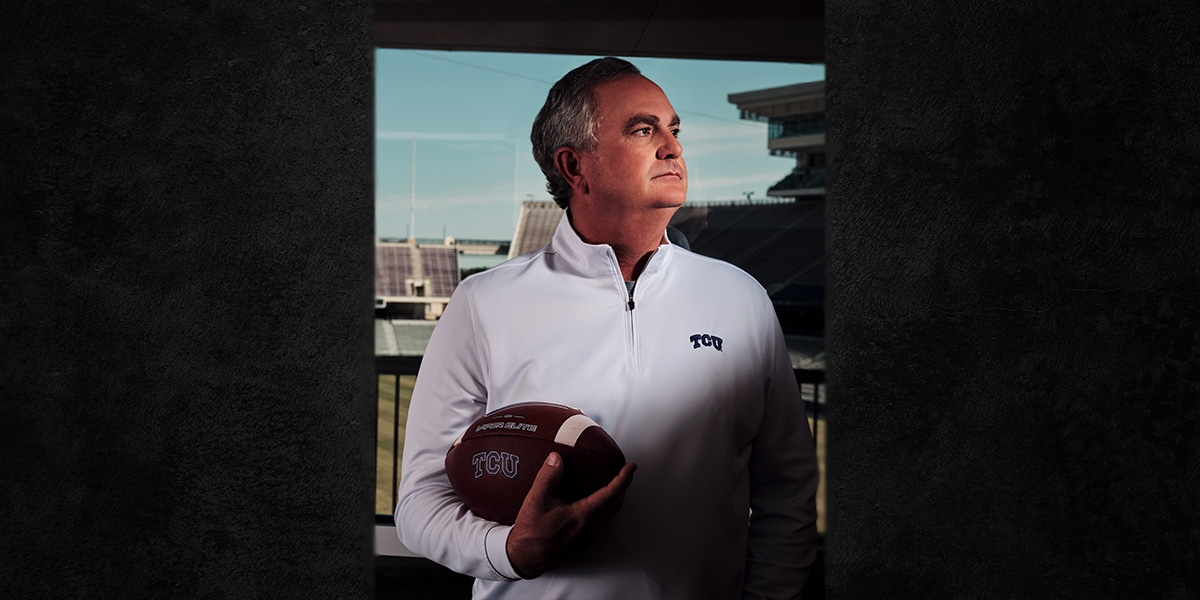Sonny Dykes first met Hal Mumme at Carter High School in Dallas in 1995 when Dykes was an assistant coach at nearby Navarro Junior College. The lack of regulations at the JUCO level afforded Dykes the ability to recruit year around, so he drove an hour northwest up I-45 each morning after teaching a creative writing course to build relationships at known recruiting hotbeds such as Carter, Kimball, and Lincoln.
Dykes was a reluctant entrant into college football. He played baseball at Texas Tech and rebelled against following in his legendary father’s footsteps. His dad, Spike, spent more time with other people’s kids than his own. Such is life as a coach. Dinner wasn’t until 10 p.m. most nights because that’s when Spike returned home from work as Texas Tech’s head coach.
“He’d go watch The Tonight Show and I’d go to bed,” Sonny remembered. “I just didn’t have a desire to coach. My older brother was doing that, too. I was going to do my own thing.”
The family also moved a lot. Sonny was born in Big Spring and then moved to Alice. The family spent a handful of years in Austin before heading out of state for stints in Albuquerque, N.M. and Starkville, Miss. They returned to the Lone Star State when Spike worked in Midland prior to landing in Lubbock.
Sonny, 53, wanted to be a pilot in the Air Force Academy, but his eyesight wasn’t perfect. A few days shadowing a lawyer was enough to know that practicing in a courthouse wasn’t as fun as on a field. At a crossroads, he fell back to familiarity. He fondly remembers a full house after games with fellow coaches and their families mingling together. Family vacations and holidays were also shared with the staff.
“I figured life wouldn’t be much fun without that,” he said.
Sonny formulated a plan to replicate that family feel within a coaching community without all the moving. He decided that becoming one of those Texas high school coaches that sticks at a program for 40 years until retirement sounded like a more stable life to raise a family in than the one he experienced.
He took a job as an assistant at J.J. Pearce High School in 1994 and was planning to join the staff at Southlake Carroll in 1995 before he received an offer from Navarro that he thought was too good to turn down. Navarro offered Sonny a 10-month contract that included $4,000, a dorm room, and free meals.
“I’m thinking 40K a year plus room and board sounded like a great deal,” he remembered. “My first paycheck was $277. I thought I was getting four thousand a month, not total. My car payment at the time was $240. I usually spent the remaining money at CiCi’s Pizza.”
While Sonny grinded away at the JUCO level, Mumme’s new Air Raid offense lit up scoreboards at Valdosta State. Mumme considered Spike a mentor and the pair once spent a week together watching Hayden Fry’s Iowa Hawkeyes and Tom Osborne’s Nebraska Cornhuskers when Spike first took over as Texas Tech’s head coach.
Sonny was back in Lubbock over Thanksgiving when Spike told him that Mumme was moving from Valdosta State to Kentucky. Sonny turned down Mumme’s job offer the previous year but was more than ready to move out of dorms and into adulthood after the 1996 season. Sonny remembers calling Mumme and being shocked to hear that he could join the staff as the wide receivers coach because Mumme’s offensive coordinator at the time, Mike Leach, was going to stay behind as Valdosta’s head coach.
“Hal told me to meet him at the national coaching convention in Orlando in January and by then he’d have it all figured out,” Sonny said. “I drove from Lubbock to Orlando and as soon as I saw Hal inside the convention he said, ‘I’ve got some bad news.’”
Leach wasn’t hired as the head coach at Valdosta State, so he was following Mumme to Kentucky as his wide receiver coach. That meant Sonny could only join the staff as a graduate assistant. The problem was that Mumme offered that job to five other people and only one spot remained because the NCAA lowered GA allotment from six to two since the last time Mumme coached Division I football. Mumme told Sonny that whichever candidate got into school at Kentucky first could have the job.
“I woke up the next morning and drove straight to Lexington,” Sonny said. “I walked into the athletic offices and said, ‘Hey, I’m the new GA. How did I get into school?’ And that’s how I became Leach’s assistant.”
Sonny quickly realized that life with Leach was never boring. Leach decided that he wanted to speak to President George W. Bush, so he called Information after practice and got the number to the White House. Leach called it every day after until one day Mumme hurried into Sonny’s office and told him that some government officials wanted to talk to him about Leach.
“It was the Secret Service,” Sonny laughed. “I guess he had called enough to create a little bit of a worry.”


